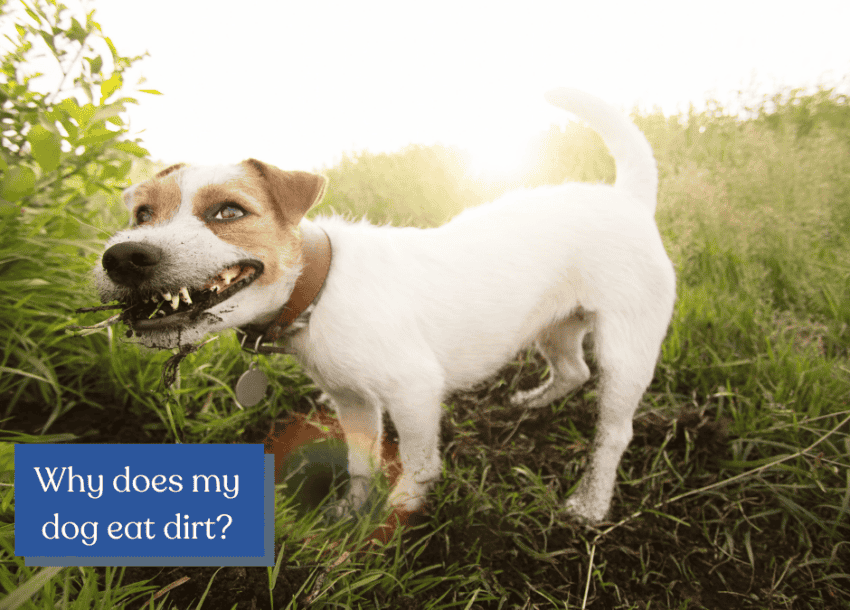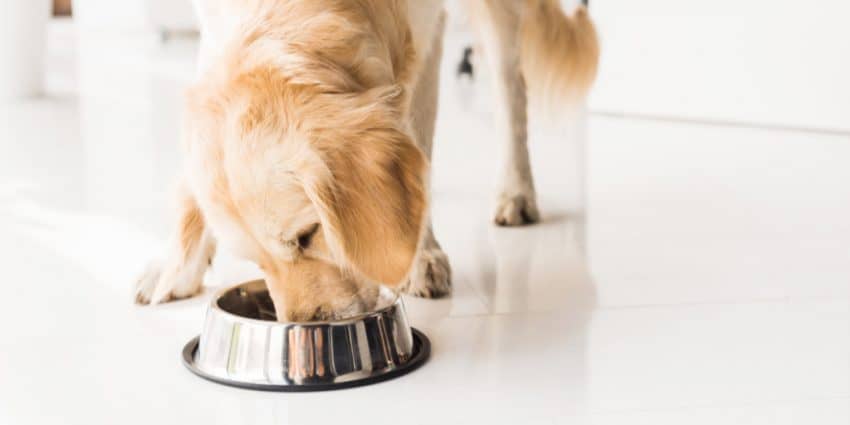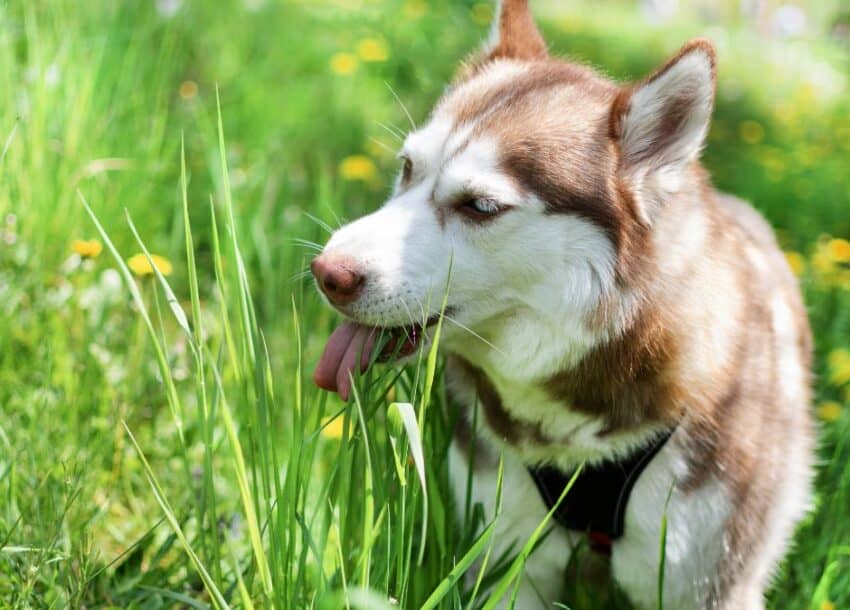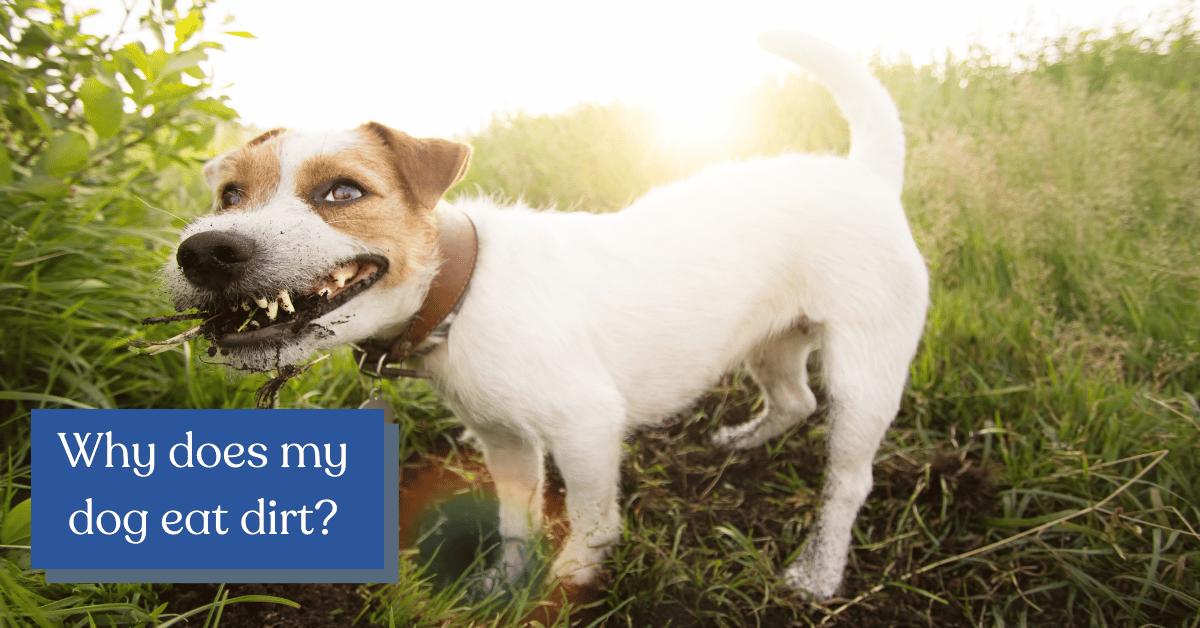Eating dirt is one of the more unsettling habits a dog can develop. It’s not a natural behavior, which makes owners a little concerned when it happens. So they often end up asking why does my dog eat dirt?
So I decided to create a guide looking into this topic. It’ll discuss all the standard reasons, tips to prevent this habit, and what dangers could occur from it. You’ll then have enough information to stop this dirt-eating business!

5 Common Reasons Why Dogs Eat Dirt
A dog’s reason for eating dirt usually comes from five common causes: dietary issues, behavioral problems, portosystemic shunts, anemia, or gastritis. Let’s see what one could be causing your dog’s new-found dirt-loving ways.
1. Dietary Issues
Crafting a diet to meet your dog’s fundamental needs is a must. Most people think it only requires choosing their local grocery store’s first available dog food. But sadly, not every dog food product is high-quality.
Subpar options will actually not meet your dog’s nutritional needs. Due to this, they start looking for other ways to get their required nutrients. It makes them turn to dirt clumps to acquire minerals, such as calcium, iron, or sodium.
Aside from acquiring needed minerals, hunger could cause a dog to eat dirt. It’s a last resort option for them, but they’ll try it if it means stopping their bellies from rumbling. Either way, dirt-eating should be an eye-opening occurrence for a dog owner.
So you’ll want to do everything possible to meet their dietary needs. An excellent starting place is choosing high-quality dog food. You’ll want to look for options with a stellar reputation made by a top brand like Blue Buffalo or Wellness. If you need help finding one, here’s an article on the best grain-free dog food brands to guide you.

2. Behavioral Problems (Boredom, Stress, or Anxiety)
Dirt eating can come from specific behavioral-related issues. For instance, dogs may try eating a clump of dirt because they have nothing better to do. So it stands to reason that this behavior stems from them being incredibly bored.
A dog who feels stressed can also be known to eat dirt. It’s a way to keep their mind off whatever is causing them stress. It’s similar to how humans use breathing exercises or other means of coping with an overwhelming event.
Anxiety is another possible culprit. In particular, dogs with separation anxiety can start eating dirt. I even had it happen with my Pitbull, who suffers from this condition, so she doesn’t do well when left alone for too long.
I once left her outside for a bit longer than usual and returned to her eating dirt. It gave me a real kick in the pants to focus more on her separation anxiety. Thankfully, she’s much better now than she was back in her dirt-eating days.
3. Portosystemic (Liver) Shunt
Portosystemic shunts are rarer than our previous two causes. However, they have been known to be congenital in puppies or show up in adult/senior dogs. So they need inclusion on this list.
As for their description, portosystemic shunts are abnormal blood vessels that shut down blood flow to your dog’s liver. Their presence could cause a heap of issues and odd behaviors in your dog.
Your pup may respond to their portosystemic shunt in various unusual ways. Eating dirt is only one of them, as you could notice them being disoriented or staring off into space. Both are common indicators of a dog suffering from this condition.
Check out the video below for a more detailed explanation of liver shunts in dogs.
4. Anemia
Anemia is a condition referring to dogs who suffer from a low red blood cell count. If a dog’s anemia gets severe enough, this condition can cause them to eat dirt. As with dietary problems, this behavior is a dog’s attempt to address the issue.
It brings up the question of how a dog would become anemic. It can result from cancer, hookworms, bleeding disorders, or ticks. These conditions are often followed by symptoms like eating dirt, tiredness, weight loss, and labored breathing.
So owners need to keep an eye on their dogs, conduct routine checks of their bodies, and keep up with vet visits. If you do, it’ll be much easier to ensure anemia is never a problem for your pup. It’ll also allow you to address the condition if it does occur unexpectedly.
In the end, it’s better to be an overly cautious dog owner. It could be the difference in preventing a condition like anemia from causing long-term complications or issues.
5. Gastritis
Gastritis is a more scientific term for describing a stomach ache. It’s an inflammation in your dog’s stomach, which causes them discomfort. Dogs often react to gastritis by trying to make themselves throw up by ingesting something like grass.
But sometimes, this grass comes with a side dessert of some dirt. It’s why owners should always be on their toes whenever a dog starts eating grass. In most cases, it’s an indication of their pet feeling stomach discomfort rather than an effort to eat some greens!

How to Stop Your Dog From Eating Dirt
Owners can do certain actions to stop any dirt-eating habits from developing. I’ve actually created a list of tips to help you conquer this problematic issue. But before I start, it’s vital to note that these actions won’t work if an underlying health condition or illness causes it.
Change your dog’s food to a more nutritious top-line product. It could break this habit immediately and ensure your pup gets all the nutritional value they were missing.
If your dog starts eating dirt, divert their attention elsewhere. My favorite method is offering them their favorite toy. It’ll stop the behavior in its tracks.
Provide more exercise and mental stimulation throughout the day. It’ll help relieve stress and boredom and keep them from problematic activities like eating dirt.
Limit unnecessary access to dirt indoors. For instance, move your potted plants out of their reach so there isn’t any temptation to chomp into some dirt.
Devote time and effort to addressing any stressors in your dog’s life. If they suffer from separation anxiety, work on conquering it.
Only let your dog roam around outside with supervision. It’s less difficult to prevent something if you’re watching them. It’ll also help manage their separate anxiety,
Control their dirt-eating habits on walks by keeping them leashed. In doing so, it’s much easier to steer them away from readily available dirt clumps.
Never be afraid to schedule time with a reputable trainer or behavior specialist. Some habits require a professional’s help to conquer.
Overall, I’m confident these tips will help prevent dirt-eating issues. But if none of these work or it’s not a behavioral issue, it’s time to stop messing around with it. Take some time off and get your pup into a vet.
Why Dogs Eating Dirt Can Be Dangerous
Since you now know the causes, it’s time to look at the dangers of this behavior. You might find it hard to believe, but a dirt habit can cause many health issues. So without further ado, let’s dive into the first potential complication:
Choking Hazard and Broken Teeth
The most obvious of these dangers is dirt being a choking hazard. For instance, there could be various items inside the clump of dirt, like mud, sticks, or rocks. All of these items can cause your dog to choke when swallowing.
Furthermore, rocks and other hard objects inside the dirt clumps are challenging to chew. So your dog could break their teeth on them. It’ll just end up being another vet bill that you didn’t account for when becoming a dog owner.
Ingesting Parasites and Toxins
Dirt isn’t known for being the cleanest substance on the planet. So it shouldn’t be surprising to learn that certain parasites exist inside it, such as hookworms. These parasites aren’t anything you want inside your dog’s body.
In particular, hookworms can lower your dog’s red blood cell count. As a result, it can make them anemic and give them all those unwanted symptoms.
Similarly, toxins could be inside the ingested dirt or grass. These toxins stem from the pesticides or fertilizers sprayed on the dirt/grass. Nothing good will come from ingesting these toxins, and will make your dog incredibly sick.
Anyone who suspects their dog has ingested pesticides or fertilizers needs to call ASPCA Pet Poison Control or a similar entity. They’ll ensure you know how to proceed and give your dog the best chance of surviving.
So again, supervise your dog outside and ensure they don’t get any dirt. It’s the only way to stop and address the issues immediately. Otherwise, you’re at the mercy of your dog’s dirt-eating habit.
Gastrointestinal Obstructions
Previously, I mentioned dirt being a choking hazard. This danger doesn’t stop when it travels past the esophagus. Dirt or anything traveling inside the clumps can also cause gastrointestinal obstructions in your dog’s stomach or intestines, causing severe damage.
Gastrointestinal obstructions can be pretty scary for owners and their dogs. In fact, they usually require surgery to remove and treat them properly. So it’s vital to watch carefully to ensure your dog doesn’t ingest anything capable of causing them, like rocks, dirt, plastic, or sticks.
If your dog does ingest a problematic item, don’t hesitate. You need to get them into a vet or emergency animal hospital immediately. It’s essential to fix the issue quickly before an obstruction forms.
Inflammation and Abrasions
Ingesting dirt won’t only cause obstructions in your dog’s stomach or intestines. It’ll also do a number on the lining of your dog’s gastrointestinal tract. The infused rocks and sediments will rip it apart by causing inflammation and abrasions.
In doing so, it’ll cause your dog severe discomfort and pain. It’ll make eating much harder for them while decreasing their appetite altogether. It’s just not what you want when trying to keep your dog happy and healthy.
When Does A Vet Visit Becomes Necessary
Dirt eating isn’t a vet visit worth behavior if it’s only done once or twice. In other words, if your dog’s doing it to relieve boredom, professional help is optional. You’ll just need to follow the tips in our previous section, “How to Stop Your Dog From Eating Dirt.”
But regular dirt eating is a behavior that requires immediate veterinarian assistance. So, a vet visit is needed if this habit becomes compulsive or causes behavioral changes. After all, an underlying condition could be causing the behavior.
You can formulate a plan with your vet to prevent and stop this behavior. Plus, you’ll feel much better after going to the professionals. These visits always make me feel more comfortable treating a health condition or fixing a behavioral problem.
Conclusion
All in all, your dog’s dirt-eating habit could stem from several circumstances: a diet issue, an effort to cure their boredom or even a health condition like anemia. But whatever the cause, it’s essential to address the problem and stop your dog’s new habit.
Otherwise, the ingested dirt can cause a heap of health concerns. Your dog could choke on it, or an obstruction could form in its stomach, or various other terrifying outcomes. Any of these situations is not one a dog owner or the dog themselves want to experience.
Let us know if you have any more questions in our comment section. I’d love to continue this conversation and help you further understand why your dog has this habit. Thanks for reading!


